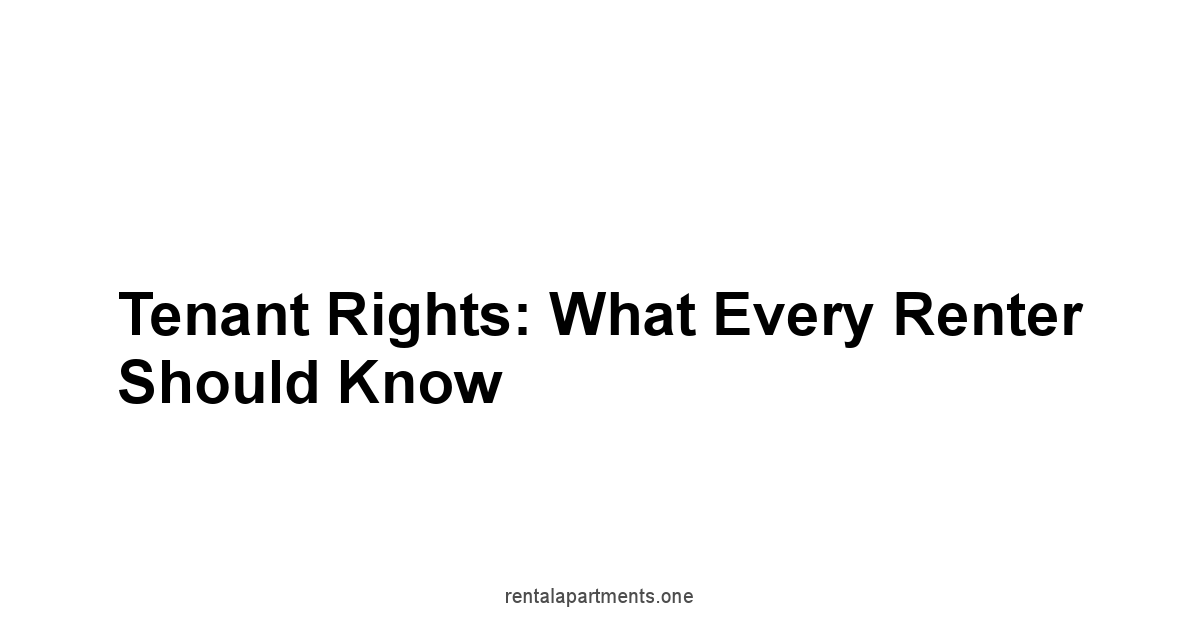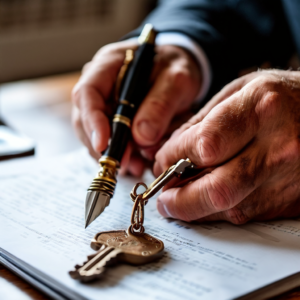Tenant rights, a phrase often whispered but rarely understood, are the bedrock of your renting experience, they ensure fairness in a market where 44 million U.S. households choose to rent.
Understanding these rights—from the sanctity of your lease agreement to the secure return of your deposit—is not optional, it’s essential.
Think of your lease, that document you quickly signed, as the detailed map of your renting journey, a complex system of rules, responsibilities, and, most importantly, rights.
It’s not just a bunch of legal jargon, it’s the rulebook for the next few months or years of your life, with every single line holding a specific meaning.
A lease is like a bible for your renting relationship, knowing it will keep you safe, and not knowing it will lead to constant issues.
Before you sign that piece of paper, make sure you’ve read every single line, and if something is not clear, ask, and keep asking until it is.
Never let your landlord rush you or pressure you to sign something that is not clear, as it will be a big mistake.
The lease comes in two main flavors: fixed-term and month-to-month.
The fixed term is the steady relationship, and the landlord cannot change the rules until it is finished.
The month-to-month is more of a fling, where either party can terminate it with a notice, so you need to know your lease to determine which one you have signed.
The lease itself needs to be reviewed as it dictates the following:
- The correct names, and address, this is a basic but crucial point.
- The lease term start and end date, do not underestimate this.
- The exact monthly rent and how to pay it, if it is not clearly written you need to ask.
- How the security deposit is held and the conditions for return, a very important topic to review.
- Late fee penalties, know what will happen if you are late.
- Who pays for utilities, and if it is included in the rent, it must be clarified.
- Who is responsible for repairs, and how to report issues, check this carefully.
- Any specific rules about pets, noise, or guests, is very important to know if it aligns with your lifestyle.
- If you can sublease the property, or not, this is important to know.
- What happens if you want to break the lease early, very important to know before signing anything.
Also important, the rent clause is more than just a number, it dictates how to pay, how much, and by what date, know the details, also, the security deposit clause, how it is held and the rules for its return, is money that is yours and should not be held by the landlord without valid reason, read carefully, the maintenance and repair clause is also important, know that if it is not your fault the landlord should be responsible for repairs, the late fee clause states the conditions if you are late, never forget to review it, the pet clause, subletting clause, alteration clause, and all other clauses, are there to set the rules of your home, and you need to know them all.
Your security deposit, that sum you handed over with a mix of hope and resignation, isn’t just free money for the landlord.
State laws vary, but many limit deposits to one or two months’ rent, and the money must be held in a separate account, not mixed with their personal funds, they cannot use it for their benefit, as it is your money, in some states they have to pay you interest on it, and you might have the right to know the name of the bank where it is being held, and the exact address.
The deposit’s purpose? To cover damage, not normal wear and tear.
Legitimate deductions might include unpaid rent or excessive cleaning, but the landlord must provide a detailed list, and even receipts if requested.
To get your full deposit back, document everything, when moving in and out, and take photos, videos, get proof that you did not cause damages, notify your landlord in writing where to send your money, and if there are deductions, dispute them with a well-written dispute, and with proof.
If it goes nowhere you can go to small claims court.
You have worked hard for your money, and it should not be taken away without reason.
A livable home isn’t a privilege, it’s your right.
The implied warranty of habitability—a legal principle in every state and city—means your landlord must provide safe living conditions, running water, heat, and a structurally sound building, whether it’s in your lease or not.
These are not optional, and if your landlord fails to provide this, you have rights that must be enforced.
Essential services like heat, water, and electricity are not luxuries, they are fundamental.
If your landlord fails to make repairs, notify them in writing, give them a reasonable time to fix it, and in some states, you can withhold rent, make the repairs yourself and deduct the costs, or even break the lease if you cannot live in the premises, you also have the right to contact local housing authority, or the health department if the place is not habitable.
Landlord entry is another important topic, as your home is your castle.
They can’t just barge in, they need to give 24-48 hours notice for repairs, inspections, or to show the place, some states require that the notice is written.
Emergencies allow for immediate entry, but those are very specific situations, and you have the right to quiet enjoyment, which means that you should have a peaceful life without the constant visits of the landlord, and if you believe they have entered illegally, document everything and seek legal advice.
Rent payments and late fees, another area where you need to be vigilant.
Rent control laws may limit how much landlords can increase rent, if you live in one of those areas.
Your lease must specify the date rent is due, and you should be aware of any grace periods, although not every state requires them.
Late fees must be reasonable, and usually, a percentage of the rent, and it should be clearly stated in your lease, and it is expected to be a one-time fee, not a recurring one.
If you struggle to pay, try to negotiate a plan, but remember the landlord can take you to court for eviction, and if you lose, you might be responsible for their legal costs, with a major impact on your credit score, as well.
Know your rights, act with responsibility, and be proactive.
Understanding Your Lease Agreement
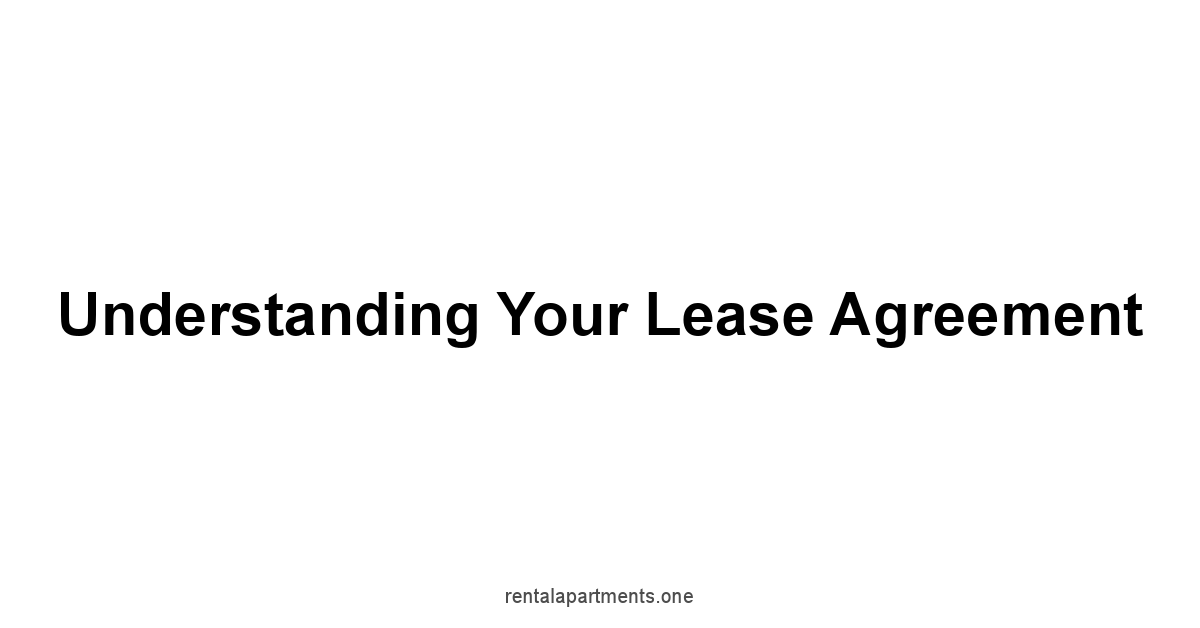
A lease, it’s a simple document, or so it seems.
But it’s the bedrock of your tenancy, the rules of the game, if you will. It spells out your obligations and your landlord’s.
Ignoring it is like sailing without a map, you might end up somewhere you didn’t intend to be.
A good lease is clear, concise, and leaves no room for interpretation.
It’s not a novel, but it is a contract, and should be treated with respect.
Think of it as the bible for your renting relationship, knowing it will keep you safe.
Before you sign your name, before you hand over a single dollar, you need to read every line.
The details are important, the fine print is crucial.
Don’t let your landlord rush you or pressure you into signing something you don’t fully understand, it’s your home for the next few months or year, there is no rush.
It will dictate a lot of your life, make sure that you are comfortable with every single line.
If a sentence doesn’t make sense, ask for clarification, and keep asking until it is clear, it’s better to look like a fool for a second rather than be one for months.
Lease Types: Fixed-Term and Month-to-Month
A lease, it comes in two main flavors: fixed-term and month-to-month.
Fixed-Term Lease: Think of it as a commitment, a definite time you agree to rent a place. It usually lasts for a year, but it can be for any period the landlord and you agree on. If the lease is for a year, it means that for a year you agree to pay rent, and the landlord agrees not to change the rules of the house, within reason.
- Stability: You know exactly how long you can stay, and the landlord knows they have a steady tenant.
- Rent: Rent is typically fixed for the duration of the lease, protecting you from increases.
- Breaking the Lease: Leaving early can be costly, potentially involving fees or owing the remaining rent.
Month-to-Month Lease: This is more flexible, a short-term agreement that renews each month. It’s for those who want the freedom to move out with minimal notice.
- Flexibility: Easy to leave when you need to with typically a 30-day notice to the landlord.
- Rent Changes: Landlords can raise the rent with proper notice, usually 30 days.
- Notice: Requires a notice to vacate from either you or the landlord, with the time frame varying by state.
Here’s a quick comparison in table format:
| Feature | Fixed-Term Lease | Month-to-Month Lease |
|---|---|---|
| Duration | Set term e.g., 1 year | Monthly renewal |
| Stability | High | Low |
| Rent Changes | Fixed during term | Can change with notice |
| Flexibility | Low | High |
| Notice to Move | Required to pay fees if early | Generally 30 days |
What to Look for in a Lease Document
The lease document, it’s the fine print, and it’s where the devil often resides. It should be read, not skimmed.
If there is anything that seems off, you need to ask questions. Everything matters in this document.
- Names: Verify all names are correct, both yours and the landlord’s.
- Property Address: Ensure the correct address is listed, it seems basic but mistakes do happen.
- Lease Term: The start and end dates of the lease should be clearly stated, pay close attention to this.
- Rent Amount: The exact monthly rent and how to pay it, the landlord must clarify this in the lease.
- Security Deposit: How much is the deposit, how will it be held, and what are the conditions for return, you will need this information for when you move out.
- Late Fees: What are the penalties for paying late, it should be clearly stated.
- Utilities: Who pays for water, gas, electric, and trash, it should be laid out in the document.
- Maintenance: Who is responsible for repairs, and how to report issues, check the landlord is responsible for repairs that are not caused by you.
- Rules: Are there any specific rules about pets, noise, or guests? This is very important to make sure that you live in a place that you like and is aligned with your way of living.
- Subleasing: Can you sublease the property if you need to move early?
- Early Termination: What happens if you break the lease?
It can feel overwhelming, but it is important to understand your responsibilities and rights.
If anything is unclear, it’s always best to ask for clarification.
Landlords are not your friends, always protect yourself.
Common Lease Clauses and Their Meanings
Lease clauses, they are the building blocks of the agreement.
Knowing what they mean is essential, otherwise you can be in a big trouble, so understanding these is key to avoid issues.
- Rent Clause: Specifies the monthly rent amount, payment method, and due date, if you are late what happens.
- Security Deposit Clause: Explains the amount of the deposit, how it’s held, and conditions for return, read this carefully.
- Maintenance and Repair Clause: Outlines who is responsible for repairs, some may be on you, but anything not caused by you should be covered by the landlord.
- Late Fee Clause: States the amount of late fees, as well as when these will be charged, you need to know what happens if you are late.
- Pet Clause: If pets are allowed, the landlord may add pet fees or additional deposit. If no pet clause exists they might not allow them.
- Subletting Clause: If you can sublease the unit, what are the conditions, or if it’s even allowed.
- Alteration Clause: Sets conditions if you can paint, install something on the wall, or change the property, it must be clarified.
- Utilities Clause: Clarifies who pays for utilities, if the landlord pays for some utilities, make sure that it is written down.
- Assignment Clause: Details if your landlord can transfer the lease to someone else, it is important to know if this can happen.
- Renewal Clause: Some leases have a renewal clause, outlining what happens when the lease is up. Usually, either it converts to a month-to-month or you have to agree to new terms.
These clauses, they are not just words.
They are legal obligations, so you must understand every single line. If something is unclear ask questions until it is.
It’s better to know than to be surprised later with a bad clause. Always read with intention.
Security Deposits: What Landlords Can and Can’t Do
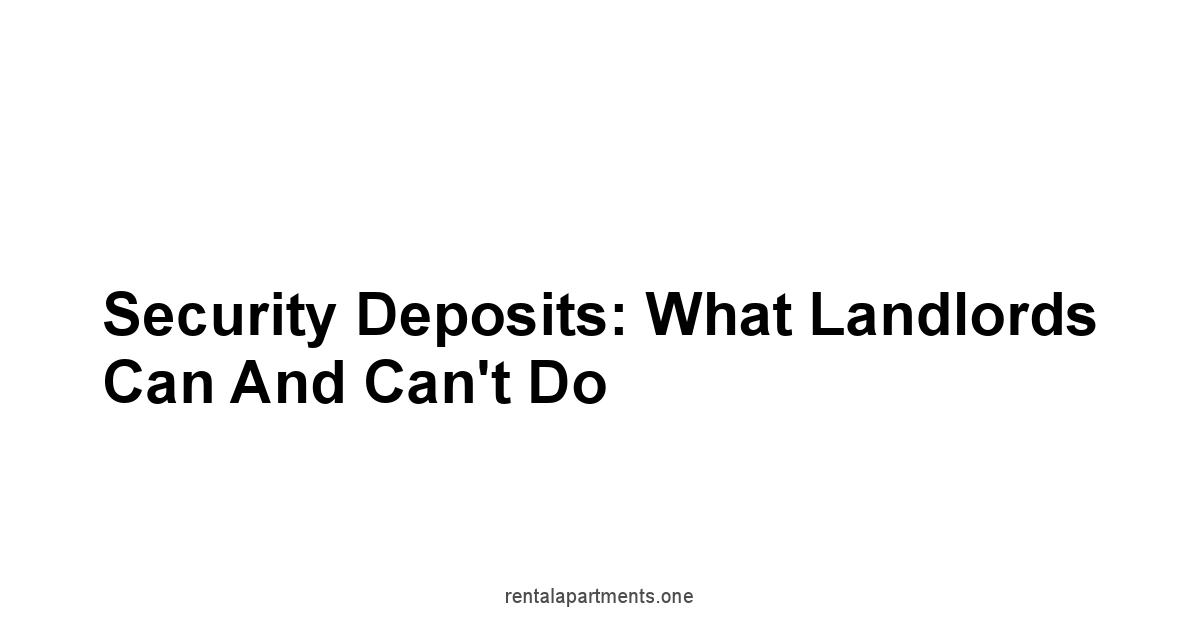
The security deposit, it’s your money, held hostage.
The landlord should not be using it for their own benefit, it is there to cover any damages.
You hand it over with the expectation of getting it back when you move out, but getting it back is not always a walk in the park, many landlords try to keep it for reasons that are not valid.
Knowing your rights about your security deposit will save you money.
Landlords, they have rules to follow, a code of conduct if you will.
They can’t just pocket your money or make up reasons to keep it, even if they try, you must know your rights. There are limits, rules, and procedures.
It’s your responsibility to be informed and to know how to protect your money.
It’s not free money for them, it is there to protect them if you caused issues.
Limits on Security Deposit Amounts
There are limits to how much landlords can demand for a security deposit, it is not an unlimited amount.
These limits, they are often set by state laws, it’s there to protect you from being overcharged by the landlord.
- State Laws: Many states have laws limiting security deposits to one or two months’ rent, check your state’s specific laws, as these vary.
- First and Last Month’s Rent: Some landlords ask for the first and last month’s rent, in addition to the deposit. However, this is not usually the same as a security deposit. The last month’s rent is rent, not security.
- Pet Deposits: Landlords might charge an additional pet deposit, or it might be included in the security deposit.
- Reasonableness: The deposit must be reasonable and in line with the rental price, check with your local laws.
- Non-refundable Fees: Some landlords try to charge non-refundable fees for cleaning, these are generally illegal. A security deposit must always be refundable as long as you have not damaged the property, normal wear and tear should not be included.
| State | Security Deposit Limit |
|---|---|
| California | 2x monthly rent unfurnished 3x monthly rent furnished |
| New York | 1x monthly rent |
| Texas | No limit |
| Florida | No limit |
| Massachusetts | 1x monthly rent |
Note: These are general limits, local jurisdictions might have stricter rules. Always check your local laws.
The rules, they are there to prevent abuse, keep the deposit fair.
Landlords cannot just charge an arbitrarily large amount, they are limited by law.
It’s your job to know these laws and enforce them when needed.
If the landlord goes against the law, you should notify them and if needed notify a professional.

Proper Handling and Storage of Security Deposits
Landlords, they don’t just get to stash your security deposit under the mattress. There are rules for that as well.
- Separate Account: Many states require landlords to hold security deposits in a separate, designated bank account, not just mixed with their own funds.
- Interest: Some states require landlords to pay interest on security deposits, make sure to check if that is the case.
- Notification: You might have the right to know which bank is holding your deposit and you might have to be notified.
- Record Keeping: Landlords should keep records of all deposits and any deductions, and provide this to you, they cannot just keep the money without giving you a valid justification.
- Commingling Funds: Mixing security deposits with personal or business funds is often illegal, the landlord should not touch your money.
- Timely Return: There is typically a time frame within which the landlord must return the deposit or provide an itemized list of deductions, some states even have a penalty for not doing it on time, check your state rules.
| Requirement | Description |
|---|---|
| Separate Account | Must be kept in an account not used for the landlord’s own funds. |
| Interest Bearing | In some states, the landlord must pay interest earned on the deposit. |
| Bank Notification | You might need to be notified the name of the bank and the address of where it is being kept. |
| Record Keeping | Landlords must maintain accurate records of all security deposits and deductions. |
| Timely Return | Deposit or itemized deductions must be returned within a state-specified timeframe. |
Your deposit, it should be safe, accounted for, and returned to you in due time.
It should be an easy process, but unfortunately it is not, many landlords fail to return it.
Always be aware of your rights, and do everything in a way that benefits you. It is your money.
Legitimate Deductions from Your Deposit
Security deposit deductions, these are where the real battles begin.
Landlords often try to deduct for things that are not valid. Know your rights.
- Property Damage: Landlords can deduct for damages beyond normal wear and tear, but not for normal wear and tear, the carpet is old it is not your fault.
- Unpaid Rent: If you owe any back rent, the landlord can deduct it from the deposit.
- Cleaning: They can deduct for cleaning, but only if the property was left excessively dirty.
- Repair Costs: Repair costs must be reasonable, they cannot overcharge you.
- Itemized List: They must provide you an itemized list of all deductions with receipts if possible.
| Deduction Type | Allowed | Not Allowed |
|---|---|---|
| Damage | Yes, beyond normal wear and tear | No, normal wear and tear |
| Unpaid Rent | Yes | No, if you paid all rent |
| Excessive Cleaning | Yes, for excessive mess | No, for normal cleaning |
| Repair Costs | Yes, if you caused the damage | No, for pre-existing damage and not your fault |
The deductions, they have to be legitimate, they have to be real.
If the landlord tries to deduct for things that are not valid, do not hesitate to dispute, it is your money.
Make sure to have all the evidence needed for any potential dispute.
How to Get Your Full Security Deposit Back
Getting your security deposit back, it’s not a given, unfortunately.
It requires effort and planning, as some landlords try to be difficult.
Here is how to get your full security deposit back.
- Read the Lease: Know what the lease says about the security deposit, this should be your bible.
- Document Everything: Take photos and videos when you move in and out, if you can get proof from the landlord that there was some damage prior to your move in, this can be good in a dispute.
- Clean Thoroughly: Leave the property as clean as it was when you moved in.
- Notify in Writing: Provide a forwarding address for the landlord to send the deposit.
- Review Deductions: If the landlord sends you a list of deductions, review them carefully.
- Dispute Unfair Deductions: If you believe deductions are unfair, dispute them in writing, state your case.
- Small Claims Court: If the dispute cannot be resolved, you can go to small claims court.
| Action | Why It Helps |
|---|---|
| Document Move-In Condition | Provides proof of pre-existing damages, so you are not liable. |
| Clean Thoroughly | Avoids unfair cleaning charges, if you leave the place as it was you have nothing to worry about. |
| Provide Forwarding Address | Ensures the landlord knows where to send the deposit. |
| Review Deductions | Allows you to catch any unfair or invalid deductions. |
| Dispute in Writing | Creates a written record of your dispute for later use. |
| Small Claims Court | Provides a legal recourse when informal methods fail. |
It’s your money, fight for it.
You have worked hard for your money, and a landlord should not be taking it away without a valid reason, many will try, but if you are informed you will always win. It is not their money, it’s yours.
Your Right to a Livable Home
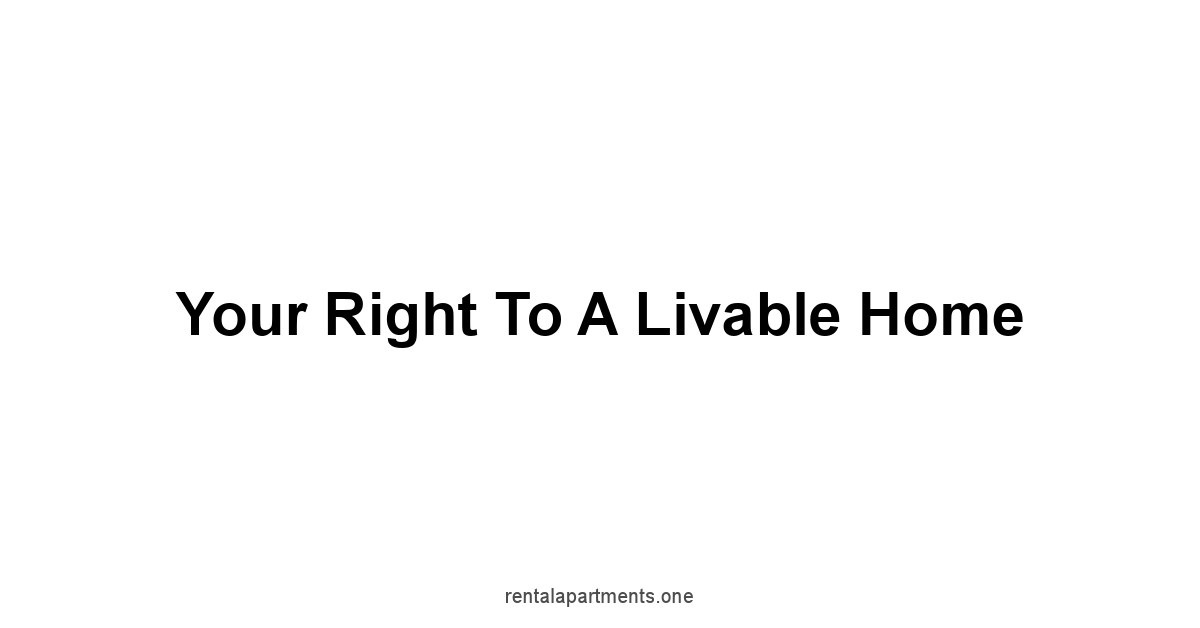
A livable home, it’s not a luxury, it’s a right. You pay rent to have a safe and habitable place.
The law protects this right through the implied warranty of habitability, which many landlords might try to hide.
It’s the basic standard a landlord must meet, no matter what they say. You have rights that need to be respected.
A home that is not safe, not livable, that’s unacceptable.
A landlord can’t rent you a place that’s falling apart, you have the right to expect certain things from your landlord, make sure to know this.
If these standards are not met, you have options, and you need to know what they are. You need to be in a safe environment.
Implied Warranty of Habitability Explained
The implied warranty of habitability, it’s a legal term, but a simple idea.
It means your landlord must maintain a basic standard of living conditions, whether the lease says it or not, it is always applied in every state and city.
- Basic Living Conditions: Landlords must provide safe and habitable conditions, that include running water, heat, and structural integrity of the building.
- Unwritten Agreement: This warranty is implied in every lease agreement, it doesn’t need to be written out.
- Safety: Landlords must ensure the property is safe, free of hazards, and it is your duty to inform them if there are any issues.
- Repair Obligations: Landlords must make necessary repairs to keep the property habitable.
- Enforcement: You have legal recourse if the landlord violates this warranty, you do not need to suffer in silence.
| Condition | Landlord’s Obligation |
|---|---|
| Structural Integrity | Safe roofs, walls, and foundations, ensuring your safety is a priority. |
| Essential Utilities | Running water, heat, and electricity, this is not a luxury, it is a basic requirement. |
| Plumbing and Sanitation | Working toilets, sinks, and sewage, you should not have to live with dirty toilets. |
| Safe Environment | Free from pests, mold, and other hazards, a place free of hazard is important. |
| Compliance with Housing Codes | Must meet local housing codes and regulations, there are rules for a reason, they protect you. |
The warranty, it’s your protection against substandard housing.
Landlords can’t just ignore it, and you don’t have to accept it.
If the conditions of the property are below these standards, it is your right to notify your landlord.
Remember, a house that is falling apart is not a home.
Essential Services Landlords Must Provide
Essential services, they are the building blocks of a livable home.
The landlord cannot ignore this obligation, and you must be informed.
- Heat: Landlords must provide adequate heating during cold months, many states have rules about minimum temperatures.
- Water: Access to running water, both hot and cold, is essential.
- Electricity: Functioning electrical systems and outlets are a must.
- Plumbing: Functional plumbing, including toilets, sinks, and showers, and they should be all working, they are basic for living.
- Waste Disposal: Landlords must ensure proper garbage removal, and should be done in a regular basis.
- Safety: Proper lighting, smoke detectors, and locks for security.
| Essential Service | Description |
|---|---|
| Heat | Adequate heating to maintain safe temperatures during winter. |
| Water | Reliable access to both hot and cold running water. |
| Electricity | Functioning electrical systems for lights and appliances. |
| Plumbing | Working toilets, sinks, showers, and properly functioning drainage. |
| Waste Disposal | Proper systems and schedules for regular garbage removal. |
| Safety | Working smoke detectors, safe lighting, and secure locks |
These services, they’re not optional.
They are fundamental to a healthy living, you have a right to them, and your landlord has the duty to provide them.
If any of these are lacking, you should start making written complaints to your landlord and keeping documentation.
What to Do if Your Landlord Fails to Make Repairs
When landlords fail to make repairs, it can feel like you’re trapped in a bad dream.
But it’s not a dream, it’s a reality, and you have options.
- Notify Landlord in Writing: Document every problem with a written notice, detailing the issue and any proof you might have.
- Set a Reasonable Time Frame: Give the landlord a reasonable time to complete the repairs, and keep this in the written communication.
- Withhold Rent: In some states, you may be able to withhold rent, or a portion of it, until the repairs are made, however this is not legal in every state.
- Repair and Deduct: Depending on the law, you may be able to make the repairs yourself and deduct the cost from your rent, not all states allow this.
- Legal Action: You can take legal action, through court or mediation to force your landlord to make repairs.
- Move Out: If the problem is serious enough you may be able to break your lease without penalty.
| Action | When to Use It |
|---|---|
| Written Notice | Always the first step to document the issue. |
| Reasonable Time Frame | Provides a deadline for the landlord to respond. |
| Withhold Rent | When allowed by state law, as a means to force your landlord to fix the issue. |
| Repair and Deduct | When permitted by law and only when it is a minor repair. |
| Legal Action | When the landlord refuses to take action. |
| Break the Lease | When the problem is severe, and the property is inhabitable. |
Do not tolerate substandard conditions. You pay for a livable place, and you should get it.
Use the steps mentioned to protect yourself, landlords will respect you if you demand the basic necessities of life.
Reporting Unsafe Living Conditions
Unsafe living conditions, they are not just an inconvenience, they are a threat to your health and safety. You have the right to report those issues.
- Local Housing Authority: Contact your local housing authority or code enforcement office.
- Building Inspectors: Request a building inspection to document any violations and damage to the property.
- Health Department: Report health hazards such as mold or pest infestations to your local health department.
- Fire Department: Report any fire hazards or unsafe conditions to the fire department.
- Police: If the conditions are threatening your safety and you have reason to fear, you can contact the local police.
- Tenant Rights Organizations: They can provide information and assistance in dealing with a bad landlord.
| Agency | What They Handle |
| Housing Authority | Violations of local housing codes and standards. |
| Building Inspectors | Document structural and safety violations. |
| Health Department | Concerns about mold, pests, and other health issues. |
| Fire Department | Fire safety violations and hazards. |
| Police | Situations that are threatening your safety. |
| Tenant Rights Organizations| Provides resources and support for tenants facing issues. |
Reporting, it’s not just about you, it’s about the entire community.
No one should live in substandard conditions, no matter who they are.
Take action to protect yourself and others who might be affected by the actions of a bad landlord.
Landlord’s Entry Rights: When and How
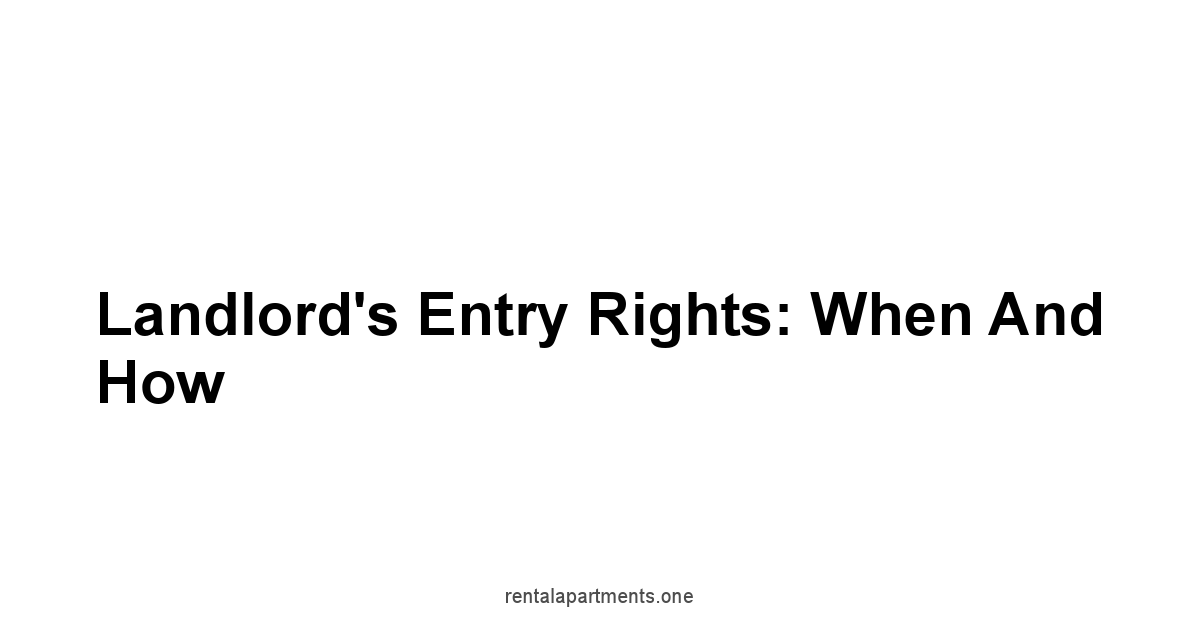
Landlord entry, it’s a delicate matter.
Your home, it’s your space, not a showroom for the landlord. They can’t just barge in whenever they please.
There are rules, and they are designed to protect your privacy, you must know them.
A landlord can’t come into your property just because they want, without a valid reason.
Your rights, they matter.
You have a right to quiet enjoyment of your property. That means a landlord needs to respect your space.
Understanding these rules is crucial, it will be the difference between you having peace and being constantly harassed.
Notice Requirements for Landlord Entry
Notice requirements, they are there to prevent intrusions into your home. Your landlord has to follow these rules.
- Reasonable Notice: Landlords typically must provide 24-48 hours’ notice before entering, unless there is a legitimate emergency.
- Written Notice: Some states require notice to be in writing.
- Valid Reasons: Landlords can only enter for legitimate reasons such as repairs, inspections, or showing the property to potential renters.
- During Business Hours: Entry should be during reasonable hours, not late at night or early morning, unless there is an emergency.
- Scheduled Times: Landlords should stick to the time given and not arrive at a different time.
- Emergency Exception: In emergency situations, landlords can enter without notice.
| Requirement | Explanation |
|---|---|
| Reasonable Notice | Typically 24 to 48 hours’ notice, but check your local state laws |
| Written Notice | In some states, notice must be in writing. |
| Valid Reasons | Must have a valid reason, such as repairs or inspections. |
| Business Hours | Entry should be during regular business hours. |
| Scheduled Times | Landlords should adhere to agreed-upon times. |
| Emergency Exception | Exceptions are made for emergencies. |
These rules, they are not suggestions, they are requirements.
Your landlord needs to respect your privacy, you need to be comfortable in your own home.
If they don’t follow them, you have options, always remember this.

Exceptions to the Notice Rule
Exceptions to the notice rule, they exist but are few. These situations are considered emergencies.
- Emergency Repairs: When there is an immediate danger to life or property, such as a fire or a burst pipe.
- Safety Concerns: If the landlord has a reason to believe that someone is in danger.
- Abandoned Property: When the property has been abandoned.
- Court Orders: If a court order is made allowing the landlord to enter.
| Exception | Description |
|---|---|
| Emergency Repairs | Immediate repairs needed to prevent damage or harm. |
| Safety Concerns | When there is a genuine concern for safety. |
| Abandoned Property | When the tenant has clearly vacated the premises. |
| Court Orders | When a court has issued an order to enter. |
These exceptions, they are not a loophole for your landlord to come and go at will.
They need to be real emergencies, that need immediate attention. Your rights need to be protected.
If there is no real emergency, they must follow the required notice rules.
Your Right to Privacy as a Tenant
Privacy as a tenant, it’s a fundamental right. A home is a private space.
- Quiet Enjoyment: You have the right to quiet enjoyment of your property, meaning freedom from unreasonable disturbances.
- Landlord Interference: The landlord cannot interfere with your privacy without a valid reason.
- Personal Space: Your home is your personal space, not the landlord’s office.
- Freedom from Harassment: Landlords cannot harass you with constant visits or inspections, you have a right to your own personal space.
| Right | Description |
|---|---|
| Quiet Enjoyment | Right to enjoy the property without constant intrusions or harassment. |
| Privacy | Right to freedom from unwarranted visits by the landlord. |
| Personal Space | Right to a home that is respected as your personal space. |
| Freedom from Harassment | Right to a living environment that isn’t constantly being disrupted by the landlord. |
Your home, it’s your sanctuary.
Landlords should respect this, you should not feel harassed or uncomfortable in your own property.
If your rights are violated, you have the option to fight for them, you do not need to suffer in silence.
What to Do if Your Landlord Enters Illegally
Illegal entry by a landlord, it’s a violation of your rights and it is not something to take lightly. Here’s what to do.
- Document the Entry: Record the date and time, and any proof you can find.
- Notify Landlord in Writing: Send a written notice informing the landlord of the illegal entry, and that this cannot happen again.
- File a Complaint: File a formal complaint with the local housing authority, if the issue continues.
- Legal Action: Seek legal advice for further action.
- Security: Install your own security cameras, to make sure you document all the entries, this can be used as proof.
- Break the Lease: Depending on the severity and state laws, you may be able to break your lease, without penalties.
| Action | What to Do |
|---|---|
| Document the Entry | Record the date, time, and specifics of the illegal entry. |
| Written Notice | Inform the landlord that the entry was illegal and it is not accepted. |
| File a Complaint | Contact the local housing authority to report the violation. |
| Seek Legal Advice | Consult an attorney to discuss your options. |
| Install Security | Consider installing cameras to document future entries. |
| Break the Lease | In severe cases, consider breaking the lease without penalty. |
An illegal entry, it’s not just an oversight, it’s a violation of your rights. You need to act, to protect yourself.
You should not live in a place where your landlord does not respect your basic rights, no one should. Make sure to always document.
Rent Payments and Late Fees
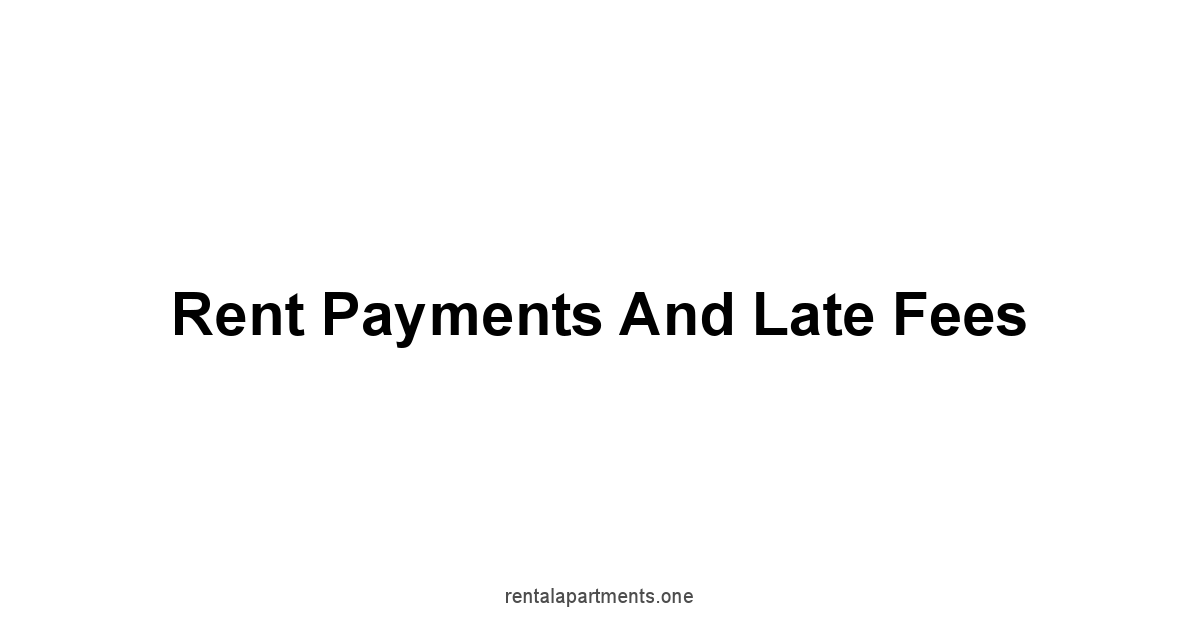
Rent payments, they are the lifeblood of the landlord-tenant relationship. You pay, they provide a place to live.
But there are rules about how much they can charge and how they can collect it.
Late fees, they are part of the deal too, but they have to be reasonable.
It’s all about fairness and transparency, you have rights.
It’s your money, and you have a right to know where it’s going, and what happens if you can’t pay on time.
Understanding these rules, it will help you to manage your rent effectively, and avoid unnecessary penalties. The landlord cannot charge you unfairly.
Setting the Rent: Legal Limitations
Setting the rent, it’s not a free-for-all.
There are limitations on how much landlords can charge, make sure to know what they are.
- Rent Control: In some areas, there are rent control laws that limit rent increases, always check if that is your area, as some states do not allow it.
- Market Rates: Landlords usually set rent based on market rates, what similar properties rent for, they must also follow this rule.
- Lease Terms: The rent is usually fixed for the term of a fixed-term lease, they cannot increase the rent in the middle of the lease.
- Month-to-Month: Landlords can raise rent with proper notice in month-to-month leases, typically with a 30 days notice.
- Discrimination: Landlords cannot set different rent rates based on race, religion, or other protected classes, as this is illegal.
| Limitation | Description |
|---|---|
| Rent Control | Local laws that limit the amount landlords can increase rent. |
| Market Rates | The average rent charged for comparable properties. |
| Lease Terms | Rent is usually fixed during a fixed-term lease. |
| Month-to-Month | Landlords can increase rent with proper notice in month-to-month agreements. |
| Discrimination | Illegal to set different rates based on protected characteristics. |
These rules, they are not optional.
They’re designed to prevent landlords from charging unreasonable rates, and you should know about them. It is not a free market, there are some rules. Your rent should be fair and not an extortion.
Grace Periods for Late Rent
Grace periods, they are a cushion for when life happens. Some landlords offer them, some don’t.
Check your lease, to see if there are any, and if not try to negotiate with your landlord.
- Lease Agreement: Check the lease for any grace periods, as it should be mentioned in the lease.
- State Laws: Some states have laws that specify grace periods, you should research these rules in your state.
- No Obligation: Many states do not require landlords to offer grace periods, however, many landlords do provide them.
- Negotiation: Try to negotiate with your landlord for a grace period, it can be useful if you know you will be late.
- Consistent Application: Grace periods should be consistently applied for every tenant, not only a few, as that can be discrimination.
| Aspect | Description |
|---|---|
| Lease Agreement | The lease will state if there is a grace period, and how many days it lasts. |
| State Laws | Some states have laws mandating grace periods, so always research the laws in your area. |
| Landlord Discretion | Most states do not require grace periods, it is at the discretion of the landlord. |
| Negotiation | You can try to negotiate a grace period before signing the lease. |
| Consistent Application | Grace periods should be consistently applied to all tenants. |
These periods, they are not an excuse to be late, but are there to help when you are in a pinch.
Know your rights, ask questions, and be clear with your landlord about payments.
It’s a business relationship, and being professional will avoid future issues.
How Late Fees Should Be Handled
Late fees, they are a reality, but they have to be reasonable.
Landlords should not be trying to extort you with late fees, as it is against the law.
- Reasonable Amount: Late fees must be reasonable, and cannot be excessive.
- State Laws: Some states limit late fees to a percentage of the monthly rent, make sure to know your laws.
- Lease Agreement: Late fees should be clearly stated in the lease agreement, as it is important to know if a late fee is applied and how much.
- Due Date: The date the rent is due, and the date late fees kick in must be clear, they can’t just charge you late fees for no reason.
- One Time Fee: Landlords generally cannot charge late fees multiple times, only a one time fee is expected.
| Aspect | Description |
|---|---|
| Reasonable Amount | Late fees must be a reasonable amount. |
| State Laws | Some states limit the maximum amount that can be charged. |
| Lease Agreement | The lease agreement should state how much the late fee is and when it is applied. |
| Due Date Clarity | The date the rent is due must be clear, with no chance of a misunderstanding. |
| One-Time Fee | Late fees should be charged only once for a single late payment. |
These fees, they are a deterrent, not a money-making scheme.
Your landlord needs to be fair, and you should be aware of the laws surrounding late fees, to avoid any issues in the future.
It is not a game for them to collect money from you.
What Happens if You Can’t Pay Rent
If you can’t pay rent, it is a serious situation, and you need to know what to expect.
- Late Fee: You will likely incur a late fee, as per the lease.
- Notice to Pay or Quit: The landlord will send a notice to pay rent or move out in a specified time, this is usually the start of an eviction process.
- Eviction: If you don’t pay, the landlord may start the eviction process, and take you to court.
- Legal Costs: You may be responsible for the landlord’s court costs if you lose the case.
- Credit Score: Late payments and evictions can negatively impact your credit score, and it will follow you.
- Negotiation: Try to negotiate a payment plan with your landlord, to avoid eviction and bad credit.
- Assistance: Seek assistance from social services or charities, to help you pay.
| Stage | Description |
|---|---|
| Late Fee | A late payment fee will be charged. |
| Notice to Pay or Quit | A notice that you have to pay or move out. |
| Eviction Process | Legal process to remove you from the property. |
| Legal Costs | You may be responsible for the landlord’s legal expenses if you lose. |
| Credit Score Impact | Late payments and evictions will negatively affect your credit score. |
| Negotiation & Assistance | Negotiate with your landlord and try to seek assistance from different sources. |
Not being able to pay rent, it’s a serious issue.
You need to know your options, and know what the next steps are.
Always try to be proactive and communicate with your landlord to avoid serious issues.
Conclusion
Navigating the world of tenant rights, it’s like reading a complex novel, but with each turn of the page, you arm yourself with invaluable knowledge.
Remember the lease is your contract, and you need to read it carefully, it should be like your bible.
It’s a document that dictates the terms of your living space, from the fixed duration of your stay to the monthly fluctuations of a month-to-month agreement.
Understanding each line, from the pet clauses to the maintenance responsibilities, isn’t about nitpicking, it’s about protecting yourself and avoiding headaches down the line.
The lease is there for both parties but it protects you, the tenant, more than the landlord, so you should be informed about your rights.
Security deposits, they’re your hard-earned money, not a free loan for the landlord, think of them as a shield against potential damages not a free ticket to money for your landlord.
State laws dictate the limits of how much a landlord can hold, and where your money should be stored, it is not a free fund that landlords can just take.
These laws also clarify the conditions under which deductions can occur, this includes damage, unpaid rent, or excessive cleaning, but never for normal wear and tear, like old carpets.
To make sure you receive your full amount back, document everything—photos and videos of your move-in and move-out conditions are your greatest allies.
If something is not right, do not hesitate to dispute, the money is yours.
Your right to a livable home, it’s not a privilege, it’s your right.
The implied warranty of habitability guarantees you essential services like heat, running water, and a safe, structurally sound building.
It is the landlord’s obligation to make sure that everything is in working order.
When repairs are needed, document every communication with your landlord, because if you need to dispute it is important that you have documented it.
If they fail to act, you have various options, from withholding rent in some states, to initiating legal action.
Reporting issues to your local housing authorities and knowing when your landlord can enter your property is also vital, that they should give you 24 to 48 hours of notice, and it should only be for a valid reason.
Lastly, rent payments and late fees.
Rent control, where it exists, puts a limit on landlords’ ability to raise the price.
Grace periods, while not always required, offer some leeway for late payments.
Late fees, should be clearly stated in your lease and must be reasonable, as they should be a deterrent not a way for landlords to make money.
If you can’t make the rent, you need to be proactive and communicate with your landlord, to seek solutions before going to court.
Remember to stay informed, know your rights, and be proactive.
With knowledge, you can be a great tenant and have a fair relationship with your landlord.
Frequently Asked Questions
What is a lease agreement, and why is it important?
A lease agreement, it’s the contract between you and your landlord.
It lays out the rules of your tenancy—your obligations and theirs.
It’s important because it protects you and the landlord, outlining the terms of your rental, rent amount, and what happens when things go wrong.
What’s the difference between a fixed-term and a month-to-month lease?
A fixed-term lease is a commitment, usually for a year.
It gives you stability, with fixed rent, but breaking it can be costly.
A month-to-month lease offers flexibility, you can leave with a notice, but your rent can be changed with proper notice as well.
What should I look for in a lease document?
You need to look for every single detail, the fine print, it all matters.
Look for correct names and addresses, the lease term, rent amount, security deposit info, late fees, who pays utilities, maintenance responsibilities, rules about pets or guests, if subletting is allowed, and early termination clauses.
What are some common lease clauses I should know?
Rent clause, it states how much you will be paying and when.
Security deposit clause, what happens when you move out. Maintenance clause, who is responsible for what. Late fee clause, how much you will pay if late.
And, many more, like pet, subletting, alteration, utilities, assignment, and renewal clauses.
Every word is a legal obligation, you must know them.
What are the limits on security deposit amounts?
Many states have limits on how much a landlord can charge. Usually, it’s one or two months’ rent.
Some landlords might ask for first and last month’s rent on top of the deposit. Pet deposits can be added on top of that. These limits protect you from being overcharged.
How should landlords handle security deposits?
Landlords have to hold your security deposit in a separate bank account, not with their own money.
In some states, they even have to pay interest on it.
They should keep records, and they must return the deposit or give you an itemized list of deductions within a set time frame.
What are legitimate deductions from a security deposit?
Landlords can deduct for damages beyond normal wear and tear, unpaid rent, or excessive cleaning.
They also might deduct for repair costs if you caused the damage.
They must provide you with an itemized list of all deductions and receipts if they can.
How can I get my full security deposit back?
Read your lease. Document everything with photos and videos. Clean everything. Provide a forwarding address in writing.
Review the deductions and dispute any that you think are unfair.
If all else fails, go to small claims court, it is your right.
What is the implied warranty of habitability?
It’s a legal term that means your landlord must provide a basic standard of living conditions—safe and habitable, with working utilities and structural integrity, whether your lease says it or not, this applies in every single state.
What essential services must landlords provide?
They must provide heat in cold months, running water, electricity, functional plumbing, waste disposal, proper lighting, smoke detectors, and locks for your security.
What do I do if my landlord doesn’t make repairs?
Notify them in writing. Set a reasonable time frame.
Some states allow you to withhold rent, or make the repairs and deduct the cost from the rent.
Or you can take legal action, if they are unresponsive.
How do I report unsafe living conditions?
Contact your local housing authority, building inspectors, health department, or fire department.
You can also reach out to tenant rights organizations.
In dangerous situations, contact the police, your safety is the most important thing.
When can a landlord enter my property?
They must provide 24 to 48 hours notice, unless there is an emergency.
They must also have a valid reason such as repairs, inspections, or showing the property.
They should enter during business hours, not during the night.
What are some exceptions to the landlord entry notice rule?
Exceptions exist only for real emergencies, like immediate danger, safety concerns, abandoned properties, or court orders.
These are not loopholes for landlords to come and go as they please.
What are my privacy rights as a tenant?
You have a right to quiet enjoyment of your property, free from unreasonable disturbances.
Your home is your private space, not the landlord’s office.
They should not enter without a valid reason, or harass you with constant visits.
What should I do if my landlord enters illegally?
Document the entry, date, and time.
Notify them in writing, that they have done an illegal entry, and file a complaint with your housing authority.
You can seek legal action, if needed, install cameras and consider breaking the lease.
What are the legal limitations on rent?
Some areas have rent control, and most places dictate that landlords can only increase rent based on market rates.
Rent is fixed for a fixed-term lease, but can be increased in a month-to-month lease with the required notice. Landlords cannot discriminate.
What are grace periods for rent, and do I get them?
A grace period, it’s a period to pay rent without penalty. Check your lease or state laws. They are not mandatory in many places.
If your lease does not have one, try to negotiate with your landlord.
They should be consistently applied for all tenants.
How should late fees be handled?
They must be reasonable, some states limit these fees to a percentage of rent. They must be stated in the lease agreement.
There should be a clear due date, and they can only be a one time fee.
What if I can’t pay rent?
You’ll likely get a late fee and a notice to pay or quit.
If you don’t pay, you could face eviction and be responsible for legal costs.
This will also impact your credit score, so try to negotiate a payment plan and seek assistance.

